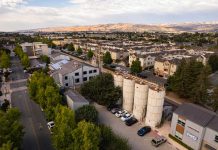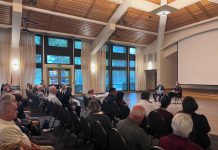Frankly, I am getting tired of the political rhetoric that continues to define conflicts over environmental regulation as a property rights issue. That is a sham foisted on us by those who think it their God-given right to make the maximum amount of money at our expense and the politicians, like Richard Pombo, who find this a convenient rallying cry.
Who would not be for property rights? It is part of the fabled American Dream. Owning your own place is a part of that which brought people to America. It was the lure that pulled the earliest settlers west, first to Kentucky and Ohio, then across the Mississippi and then clear to the Pacific. It is that same lure which has created suburbia, freeways, smog and a myriad other associated problems.
American individualism fuels the idea that what one does on and with their property is their own business. Just think of the farmer who took barbed wire and fenced the land, denying the cattleman the range to run their cattle. How many movies have been made of that theme. Or the hard working widow, just trying to make ends meet. Come back, Shane. This is deeply ingrained in our mythology.
Of course, the property rights issues are correct up to a point. The problem is that too many things that we do on or with our own property don’t stay there. They affect our neighbors as I did when I put some too-green wood in my fire ring. The smoke that came up blew into my neighbors house and he came over to ask me to shut it down. It was a problem of real concern because their son has asthma. Smoke knows no man-defined boundaries.
Such is the way with many of the problems that we have tried to solve with environmental regulation. They arise out of the fact that what one does on or with a piece of property does not stay there. Neither air nor water nor most species other than man know anything about these property boundaries we have set in courts of law.
There are many property rights advocates who even seek justification in biblical tradition. To those people I would only quote “whatsoever ye have done unto the least of these my brethren, ye have done it unto Me.” It is too easy to think of the “least of these” as some poor people living off in Africa or the Amazon. In truth, they live next door. They are our neighbors. If we were all intent on being good neighbors rather than being focused on maintaining our property values, maybe we could accomplish both.
Given that there are too many who are not willing to be good neighbors, to think of the “least of these” in such broad terms, then the vast majority of Americans believe that there is a role for government to mandate good behavior. We all agree with laws concerning theft. Why then do we not agree with laws that say “thou shalt not contaminate thy neighbors well.”
Of course environmental policy is messy. Regulations are not as neat as the four sides of a quarter-acre lot. Often we do not know precisely what is the underlying cause of everything nor do we know what the ultimate outcome of remedial actions might be. However, that should not stop us from acting according to the best scientific information available. To do otherwise is to value ideology over fact, a decision that will often cause our grandchildren to ask “What were they thinking of?”
The major issue ecological issue facing us now is that of global warming. Al Gore called in an “Inconvenient Truth.” Every day it seems that we read of something additional which is attributed to global warming. Just this week, I am watching the smoke from the Del Puerto Canyon fire. It is a very large fire burning mostly on private property. I studied this week the reports linking the size and frequency of major fires in the west to global warming and the climatic changes that it is bringing.
Most of the acreage consumed by this fire is private property, whose owners have rights. Do they have the right to expect that the rest of us will have taken steps to lessen greenhouse gas emissions? They are the ones whose buildings were destroyed and whose livestock, if they survived, no longer have range grass to feed on. These are not tenuous, maybe, maybe not, connections. The facts are real. It is not enough just to think of this fire as yet another accidental disaster. There are things that we can do to lessen the impact and, were we good neighbors, we would. We all contribute to global warming. Maybe it is time we accept the fact that good neighbors do not let their neighbor’s place burn.
“Anytime you have an opportunity to make things better and you don’t, then you are wasting your time on this Earth”
~ Roberto Clemente
Wes Rolley is an artist and concerned citizen. The Board of Contributors is comprised of local writers whose views appear on Tuesdays and Saturdays.







